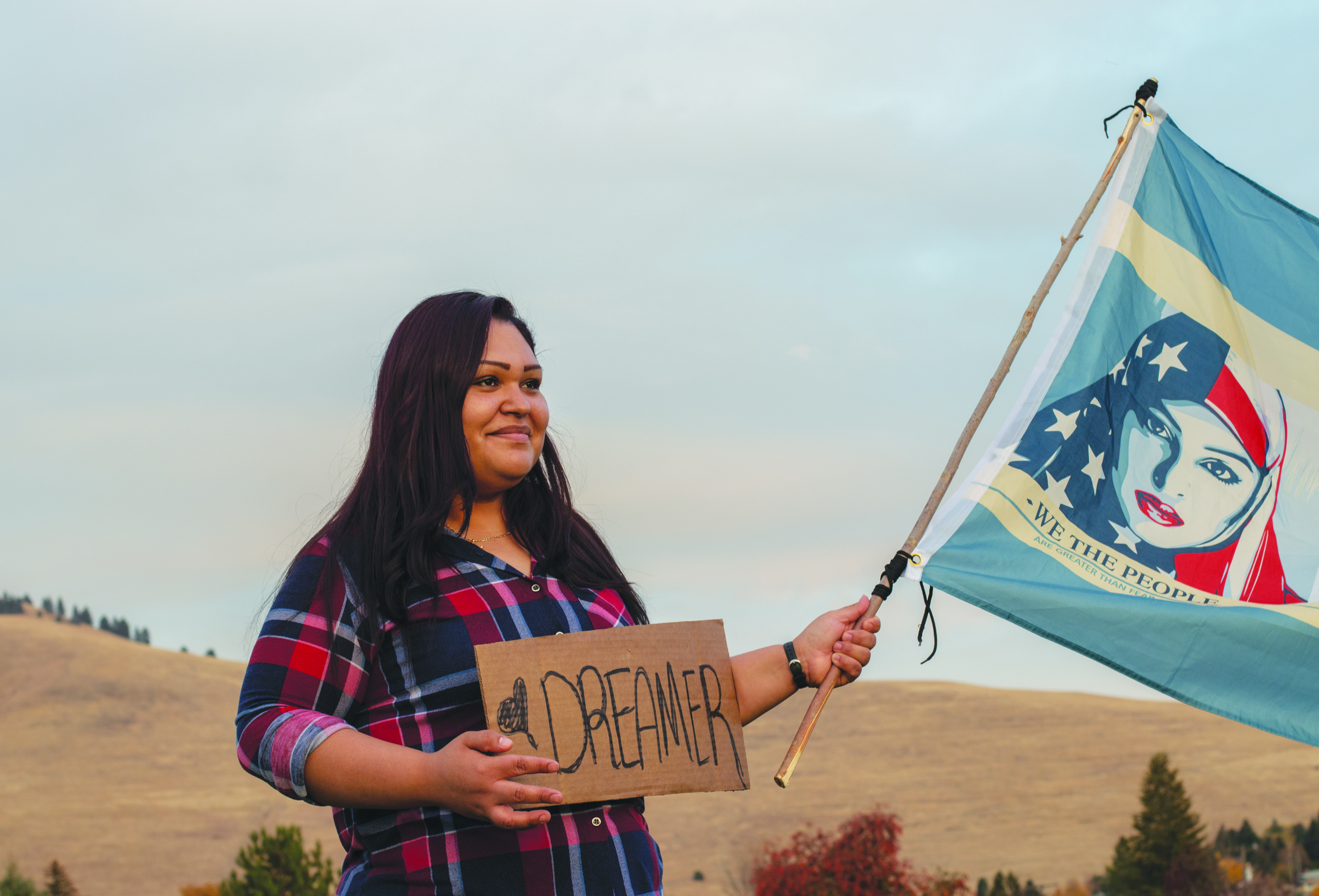Becoming a Dreamer

From Mexico to Missoula, Nereyda Calero’s journey
led her to help fellow immigrants.
STORY BY SAMANTHA WEBER | MANAGING EDITOR
WHEN FORMER U.S. Attorney General Jeff Sessions announced that the Deferred Action for Childhood Arrivals (DACA) program would be rescinded in September 2017, 30-year-old Nereyda Calero, a Mexican immigrant and DACA recipient, was sitting in her Missoula home. When she heard the news, tears streamed down her face.
“I remember being there on the couch and I thought, ‘God, help me,’” Calero said. “I’ve got to do something. Help me fight for this.”
Three months later, Calero was chatting about immigration policy in Sen. Jon Tester’s Washington, D.C. office.
I first saw Calero at the Missoula Women’s March in January 2018. She spoke to a crowd packed shoulder-to-shoulder about her experience as an immigrant and a woman of color, and many people, including myself, were moved to tears by her passion. When I met her during the summer, I was surprised. During her January speech, she seemed larger than life. In reality, she speaks softly and exudes a quiet humility. Freckles splash across her round face beneath perfectly groomed eyebrows. She looks put together, and her appearance is always completed by a delicate, gold crucifix necklace. She didn’t strike me as the sort of person who would be comfortable giving ardent speeches, but she is when she’s talking about something for which she cares deeply.
At just eight years old, Calero crossed the Mexican border into Arizona with some relatives in the midst of blazing July heat. It was their fifth attempt. They made their way to Las Vegas, where she lived with family for years. In 2012, she came to Missoula for better work opportunities.
Before DACA became available in 2012, Calero dropped out of school to begin a long string of cleaning jobs. She’d been on the honor roll and dreamed of becoming a doctor or lawyer, but she always knew that, as an undocumented immigrant, there were few options for her future.
“That was very difficult, growing up knowing that time is passing by, you’re not going to become legal, you’re not going to be able to do what you want,” Calero said. “It’s very frustrating. It’s like you’re trying to walk and something’s pulling you back, you know?”
She applied for DACA immediately. She said she felt like she finally existed. DACA grants immigrants, who were brought to the U.S. as children, renewable two-year permits that protect recipients from deportation and allow them to get U.S. work permits.
After Calero received her DACA status, she enrolled in an emergency medical technician course and got a job at a local hospital and a driver’s license. She could finally drive to work and take her two young sons around town without a police car in her rearview mirror sending her heart racing.
“I was starving for this,” Calero said. “To be what I wanted to be.”
Calero carries herself quietly and she accepts praise with bashful smiles. She’s quick to give credit to other people. It appears she spent most of her life trying to blend into the crowd undetected.
Now she stands out. Since she began speaking up for better immigration policy, she’s become a leader for the immigrant community in Missoula. She speaks, fights and marches for those who can’t risk exposing themselves in the current fraught political climate, one riddled with anti-immigrant sentiment.
“They can’t put their voice out there because they’re afraid,” Calero said. “And I can do it for them because I don’t want them to go through this.”
Since President Donald Trump took office, Calero said the immigrant community has been increasingly frightened. U.S. Immigration and Customs Enforcement (ICE) only had a small presence in Montana before the Trump administration took over. In 2018, ICE raided a commercial morel mushroom picking camp in Mineral County, arresting 10 people on immigration-related charges. A Mexican man and longtime resident of Hamilton was sentenced to deportation in September 2018 after ICE agents and U.S. Border Patrol agents showed up at his home early one March morning. Today, workplaces around Missoula are littered with racist graffiti. Calero has the evidence, photos and videos, on her cell phone.
She said some of the patients she cares for as an EMT at the hospital tell her Mexicans are terrorists, that she needs to go back to Mexico when her DACA status expires, if the program isn’t protected in the future. Her older son’s classmates have told him to leave, to just wait until Trump builds a wall. Both of her children were born in the U.S. She speaks to her kids in a mix of English and Spanish, but she said she hesitates to call out to them in Spanish in public now.
Calero feels especially motivated to act when racism and hate affect her children, or any children for that matter. Her younger son’s father was apprehended on his way to work four years ago in Missoula and immediately deported. Now, instead of looking to police to protect him, her son thinks of them as the bad people who took his father away. Those scars are permanent, Calero said, and no child deserves to live with them.
“This will affect kids present and future,” she said. “These are kids that we are making. We’re making them grow like this, with fear in their hearts.”
Though Calero has watched people grow more confident in spewing racism aloud, she said she can feel society changing for the better. She thinks a lot of people are as sick of injustice toward immigrants as she is.
“I think everybody wants to have a change after all that’s been happening,” Calero said. “We all want a change. And we’re not going to have a change while we have this administration.”
